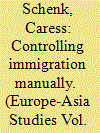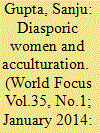|
|
|
Sort Order |
|
|
|
Items / Page
|
|
|
|
|
|
|
| Srl | Item |
| 1 |
ID:
117592


|
|
|
|
|
| Publication |
2012.
|
| Summary/Abstract |
In this article, the impact of diminishing levels of uncertainty on labour demand, as a consequence of conflict resolution processes, is tested by means of a case study of a European region largely affected by political violence. For this purpose, the response of Basque manufacturing employment during conflict resolution attempts is used as a natural experiment with which to evaluate the effect of reduced uncertainty on labour demand. Accordingly, using the difference-in-differences technique, which overcomes some of the shortcomings of previous studies, the relative performance of Basque labour demand during the last two attempts to bring peace to the region is quantified. The longest ceasefire episode ever declared in the region is shown to have triggered a reactivation in labour demand and, therefore, that Basque manufacturing firms responded positively to the reduction in uncertainty by significantly raising their average number of employees. More precisely, it is found that the average number of workers employed by Basque manufacturing firms increased considerably when credible peace talks directed towards the end of the conflict were undertaken. Thus, when compared with their counterparts in similar Spanish provinces, the truce declared in 1998 boosted employment demand in Basque companies by more than 4%, which reflects the economic dividend of peace to be reaped in the event of an eventual conflict resolution and the establishment of a peaceful environment in the region.
|
|
|
|
|
|
|
|
|
|
|
|
|
|
|
|
| 2 |
ID:
122829


|
|
|
|
|
| Publication |
2013.
|
| Summary/Abstract |
In 2007, the Russian government instituted quotas for immigrant work permits that were consistently lower than actual labour demand. While low quotas are politically popular on the mass level, this article argues that low quotas are also a tool of the government to distribute patronage resources to regional political and economic elites. For several years after quotas were instituted, they remained quite controversial, and during this time decisions about them were firmly in the hands of Vladimir Putin, first as president and then as prime minister, giving him a powerful tool to control the immigration process and labour market manually. While this type of manual control is effective in the short term to manage contentious policy arenas, it suffers a number of possible long-term consequences.
|
|
|
|
|
|
|
|
|
|
|
|
|
|
|
|
| 3 |
ID:
128182


|
|
|
|
|
| Publication |
2014.
|
| Summary/Abstract |
Diasporas are the human face of the globalization process. The contemporary importance of Diasporas can be related to the seemingly contradictory historical processes of consolidation of national cultural identities and large international migrations. Though the phenomenon of migration is as old as the existence of humanity, international migration on a large scale started during colonial times. Labour demand, political conflicts, technological changes and trade and commerce together, contribute to international migration becoming one the most important determinant of modern global change.
This paper attempts to explain the cross cultural conflicts, trauma, isolation, aspirations and dilemmas of the Indian Women immigrants in Jhumpa Lahiri's The Namesake , especially Aashima Ganguly, who find herself in between the native culture and host culture and her trishanku experience of being neither in Calcutta nor in America which is at the very centre of diasporic trauma. Ashima is a true representative of the majority of women expatriates who are reluctant to change or adapt to the culture of the host country. But still she sacrifices all her comforts for the sake of her family and like the typical traditional Indian women; her life revolves around her husband and children.
|
|
|
|
|
|
|
|
|
|
|
|
|
|
|
|
| 4 |
ID:
159808


|
|
|
|
|
| Summary/Abstract |
This article investigates the impact of casualization on the labour market of organized manufacturing industries in India. In specific, this article analyses the impact of casualization on the labour demand and output elasticity of 15 manufacturing industries in the post-liberalization period for the direct production workers. Dynamic panel data analysis of system generalized methods of moment method is used here for the estimation of lagged labour demand for permanent production workers. Aggregate level analysis ensures that casualization has a significant positive impact on the labour demand and on output elasticity. Disaggregate level analysis also confirms the significant positive impact on the output elasticity at individual industry level. However, wage share of the workers falls along with the increase in the usage of contract workers across most of the industries. Output elasticity increases but at the cost of falling wage share. Casualization generates more job opportunity but reduces the wage share for the permanent production workers in post-liberalization period.
|
|
|
|
|
|
|
|
|
|
|
|
|
|
|
|
|
|
|
|
|